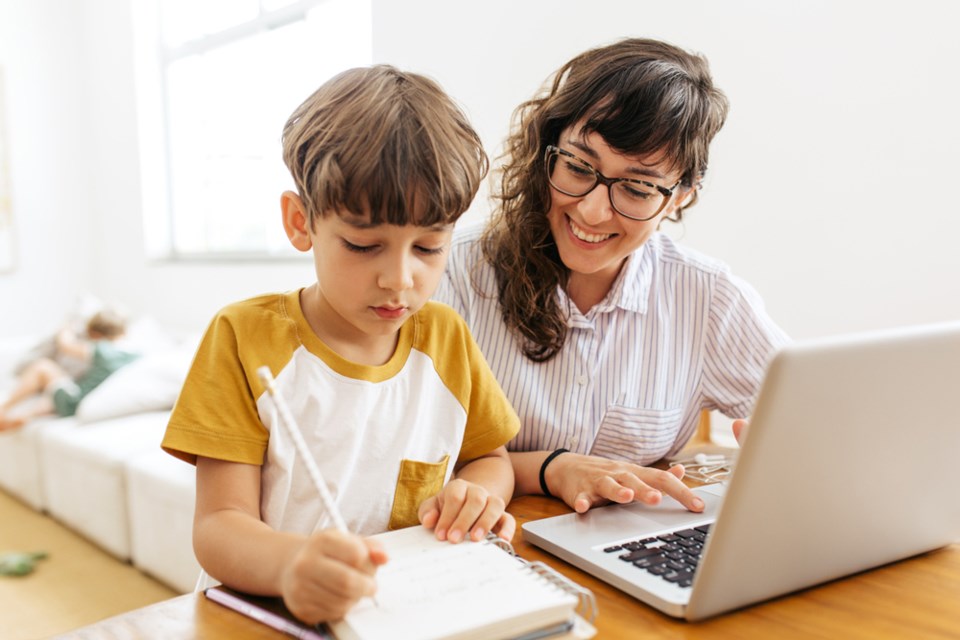It’s easy for kids to get distracted.
Trying to do more than one thing at a time can lead to a string of half-completed tasks, panic-inducing deadlines and missed goals.
Learning to do one thing at a time, focusing and finishing something before moving on to the next, are essential skills for school success.
“These pandemic years have caused a lot of disruption to everyone’s schedules, but especially to students. The switch between in-person and remote learning has challenged everyone’s version of ‘normal.’ By setting daily routines in place, children will acquire better study habits and focus a bit more naturally,” says Samantha Allen, centre director at the Sylvan Learning Centre of Coquitlam & Burnaby.
Sylvan is focused on ensuring students’ academic success through its proprietary personal tutoring programs.
Although there may be times when multitasking is okay, studying is certainly not one of them.
Here are 10 tips for how to help your children learn how to focus by establishing good habits now.
1. Pay attention in class
Much of the muddle and confusion in any class happens because someone hasn’t been paying attention.
Make sure your child understands the importance of classroom time.
2. Take your time
Haste makes waste. Racing through something important can be dangerous, and can lead to mistakes.
Taking a moment to pause and understand the task at hand can help your child avoid errors such as misreading test directions, or hurrying through a book report and making typos.
3. Take breaks
It’s hard for some kids to take their time. Allow plenty of breaks to let them expend energy before getting back to work.
Decide together how much time should pass and how much work should be accomplished between breaks.
“It has been said that children exhibit solid focus for their age plus five minutes,” Allen says.
“Take this into account when planning study time and allow for necessary breaks.”
4. Do one thing at a time
Better grades, more confidence, enhanced skills and broader knowledge will eventually speak for themselves.
But at the beginning, you’re going to have to put your foot down at homework and study time. Random monitoring works wonders.
5. Eliminate distractions
“Often children’s bedrooms have a lot of distractions, so many families have their children do homework at the kitchen table,” Allen says.
It’s an acquired skill, but organizing themselves helps to get rid of distractions. Expect them to do this at home and in their classrooms.
6. Prioritize
Learning to place tasks in order from most important to least important will help kids learn to focus on the right things.
For example, the optional cover picture on a book report should come after they’ve read the book and written the report. Going over their assignments and the due dates with them will allow you to guide them.
7. Plan
Helping children plan their time lets them learn organization and see how it all fits together. Kids need consistency and routine (even if they roll their eyes at it). Creating a plan helps everyone stay in check, on task and makes it manageable.
“Use a planner,” Allen says. “Most students receive a planner from their school; if not, purchase one that they like and will enjoy using.”
8. Manage temptations
Learning self-control is never easy, but saying “no” to someone or something today can be what it takes to meet tomorrow’s deadline.
9. Control interruptions
We can’t eliminate all maddening interruptions, but we can help kids control interruptions rather than letting interruptions control them. Insisting on silencing electronic interrupters is a good start.
10. Assess
Having your child ask him or herself, “When am I at my most productive?” and “When do I learn best?”
Assessing their habits, skills, strengths and attitudes will give your child a sense of self-awareness and the ability to plan time accordingly.
To get started with tutoring support to end the school year strong, visit Sylvan Learning online today at www.sylvanlearning.com.



